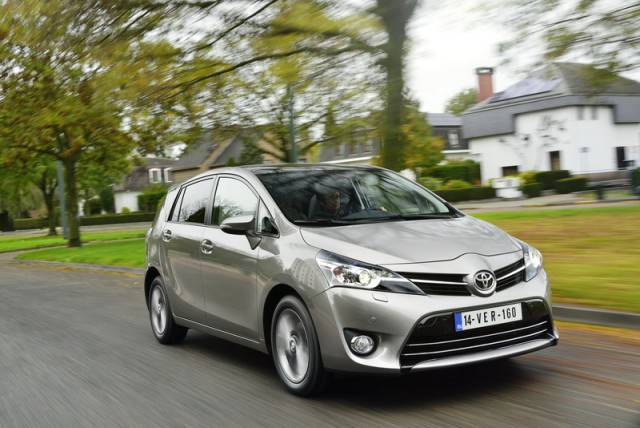Overall rating: 3.5/5
Toyota's Verso is a more appealing product than it ever has been before, with sharper looks and a superb new BMW-derived diesel engine. But its lack of both interior space and dynamic sparkle keep it just behind the class leaders.

In the metal 4/5

Toyota refreshed the Verso last year and it has gone from an anonymous box to something with a bit of visual clout. The front end treatment is particularly good, while the back is at least neat, if not very striking. As seven-seat MPVs go, it comes across as surprisingly small on first acquaintance, which is a feeling that carries over inside.

Because the Verso is not really big enough for a seven-seater. It's more of a 5+2. The back two seats really are for only the smallest of children, and with them in place there's not much of a boot for clobber. However, the three separately-adjustable seats on the middle row are spacious enough, there's loads of room in the front and there are clever storage spaces everywhere. In terms of fit and finish, it's not bad in the Verso either, but there are still one or two plastics and ergonomics that feel a bit behind the times.
Driving it 3.5/5
The big talking point is the new BMW-derived 1.6-litre turbodiesel engine, which means the demise of the old 2.0 D-4D unit. The new 1.6 is 20kg lighter than its predecessor, it's eight per cent better on fuel at 62.8mpg combined, 10g/km cleaner for CO2 emissions at 119g/km, yet still makes 112hp and 270Nm - comparing favourably enough with the outgoing 2.0's 124hp and 309Nm. You can expect to see this engine in all manner of other Toyota products in the months ahead.

And this downsizing is really the best news for the Verso, as the engine is excellent. It never struggles in this size body and Toyota has reengineered various items - such as the engine mounts, the dual-mass flywheel, its intake, cooling and fuel systems, and even the six-speed manual gearbox and driveshafts too - to ensure the engine is quiet, smooth, responsive and economical. The Japanese carmaker has certainly hit all its marks.

It has also been designed to rev more, with one engineer telling us it can easily hit 70mph in third gear, making it a breeze to join motorways. That's true up to a point - it's responsive low down and linear out to 4,000rpm peak power, but putting a 5,000rpm redline on the car was an odd move, given the engine has no intention of ever getting there. However, as a big plus, despite getting a bit throaty if you do extend it, most of the time the 1.6 is admirably hushed and placid throughout.
Elsewhere, the Verso is a perfectly pleasant enough thing to drive, but will offer little to the mums and dads who enjoy a bit of a back road blast every once in a while, on those rare occasions when the kids have been fobbed off to someone else. It's not that we expect the Verso to be a dynamic firecracker, it's just that other cars in this segment - most notably the Ford S-Max - have better-judged controls. The steering is very, very light and the brakes have a huge amount of dead travel at the top of the pedal before they begin to really bite. And even then, they're adequate rather than capable. The manual gearbox is smooth enough, thanks to Toyota's tweaks, but not very tactile.

However, our driver-related grumbles are countered by the Verso's ride and composure. It's an utterly serene operator, limiting tyre roar and wind noise very well at most speeds, while the ride is extremely good - perhaps the real crux of the matter, and the characteristic that will endear it to most buyers. It also returned around 48.7mpg on a very taxing mountain-and-city route that wasn't in any way conducive to fuel economy, so a quoted 62.8mpg combined doesn't seem too far-fetched.
What you get for your money
We're going to have to leave this section mostly blank for now, as it's pure guesswork. We can't imagine that Toyota will charge more for the 1.6-litre engine than it does for the 2.0 so the most we expect the new version to start from is €25,000. It will hopefully be less thanks to lower VRT and we presume it'll soon become the best seller, possibly to be offered in Terra, Aura and Luna SkyView trim levels.

Worth Noting
The Verso is an entirely Toyota Europe-created machine - it is designed, engineered and built here. Those European sensibilities reflect the fact this is the MPV's key market battleground, and what it means is the car is better suited to our tastes than previous offerings from Toyota.
Summary
The 1.6-litre engine is a great addition to the refreshed Toyota Verso and it's a fine car, with much more appeal than its predecessor. There's no glaring reason why you shouldn't buy one, given it looks pretty good, has a high level of refinement at most speeds, should be very reliable and looks to be as economical as claimed. It's even fairly well-equipped and competitively priced too. However, it is on the small side for a seven-seat MPV and with the sharper-driving S-Max, bigger Citroen C4 Grand Picasso and more stylish Opel Zafira Tourer in its particular pond, the Verso is likely to remain a pragmatic alternative to more desirable machines, as the Toyota just lacks that extra little bit of vivacity to put it among the class front-runners. However, the pricing will determine where it sits.









































